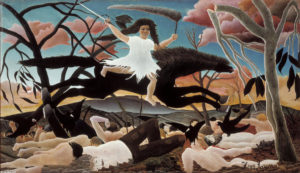 Writing in the American Conservative, Will Collins reviews Against the Grain, “James C. Scott’s new history of humanity’s transition (devolution may be the more appropriate term) from hunting and gathering to sedentary farming challenges the very foundations of this narrative. After finishing the book, one can’t help but wonder if our nomadic ancestors would have been better off slinking back to the hills and forests and giving up on the idea of ever settling down.”
Writing in the American Conservative, Will Collins reviews Against the Grain, “James C. Scott’s new history of humanity’s transition (devolution may be the more appropriate term) from hunting and gathering to sedentary farming challenges the very foundations of this narrative. After finishing the book, one can’t help but wonder if our nomadic ancestors would have been better off slinking back to the hills and forests and giving up on the idea of ever settling down.”
In Collins’ view, Against the Grain “may not include much in the way of original research, but it presents a comprehensive and convincing case that the transition from hunter-gatherer nomadism to permanent, agriculturally dependent settlements was a complete disaster for humankind.”
I haven’t read the book, which does indeed sound interesting, but it appears that (judging by the review) Rousseau’s ‘noble savage’ has cast a long shadow over its contents:
[W]hat if Rousseau was right? Scott persuasively argues that sedentary agriculture is a critical prerequisite for state formation and all its attendant miseries, from slaving to war-making to the spread of pestilence and disease. For hundreds of thousands of years, a period that encompasses the vast majority of our existence on Planet Earth, man was born free, into groups of mobile hunter-gatherers who, if the fossil record is to be believed, lived longer and healthier lives than their civilized successors. It was not until comparatively recently that we were chained by the plow, the ox, and the overseer. The historical record of our earliest ancestors is the most compelling evidence yet that there is something deeply unnatural about being socialized into a rules-based, hierarchical society.
To banish that shadow, read of Lawrence Keeley’s excellent War Before Civilization: the Myth of the Peaceful Savage.
Here’s what the Oxford University Press had to say about it:
For the last fifty years, most popular and scholarly works have agreed that prehistoric warfare was rare, harmless, and unimportant. According to this view, it was little more than a ritualized game, where casualties were limited and the effects of aggression relatively mild. Lawrence Keeley’s groundbreaking War Before Civilization offers a devastating rebuttal to such comfortable myths and debunks the notion that warfare was introduced to primitive societies through contact with civilization.
Building on much fascinating archeological and historical research and offering an astute comparison of warfare in civilized and prehistoric societies, from modern European states to the Plains Indians of North America, Keeley convincingly demonstrates that prehistoric warfare was in fact more deadly, more frequent, and more ruthless than modern war. He cites evidence of ancient massacres in many areas of the world, and surveys the prevalence of looting, destruction, and trophy-taking in all kinds of warfare, again finding little moral distinction between ancient warriors and civilized armies. Finally, and perhaps most controversially, he examines the evidence of cannibalism among some preliterate peoples.
But Keeley goes beyond grisly facts to address the larger moral and philosophical issues raised by his work. What are the causes of war? Are human beings inherently violent? How can we ensure peace in our own time? Challenging some of our most dearly held beliefs, Keeley’s conclusions are bound to stir controversy.
Indeed. They did.
Bottom line: we’re not a nice lot.
Just before the paragraph that I quoted above, Collins wrote this, words that should be carved in stone in some suitably disconcerting venue, opposite a church perhaps, or across from the Jefferson Memorial:
Take natural rights, a venerable political tradition that has largely been banished from our public discourse. Rights are socially constructed, a product of contingent historical circumstances, a tarnished artifact of Western culture. Only the truly gauche—hardcore libertarians, say, or Christian conservatives—believe that we are endowed with certain inalienable and unalterable rights. Rousseau’s famous dictum, “Man is born free, and everywhere he is in chains,” sounds like something you might hear from a particularly obnoxious teenage Objectivist.
